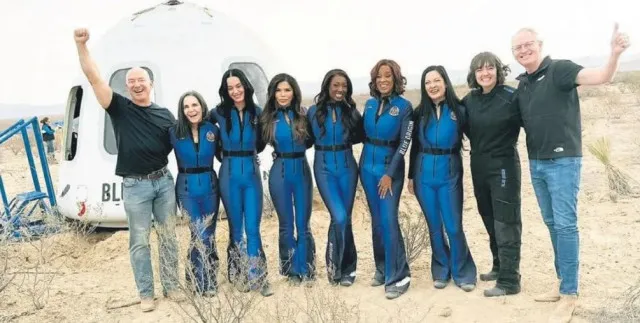Katy Perry’s journey aboard Blue Origin was marketed as a feminist milestone. But was it really about empowerment—or just another PR move from the ultra-rich?
Perry framed her space trip as a win for women, but critics aren’t convinced
Pop icon Katy Perry joined five other women on a 10-minute Blue Origin mission, reaching the Kármán line—the widely accepted edge of space.
Promoted as a historic moment for women in space, the all-female team marked the first of its kind in six decades. Perry, 40, called the trip an inspiration for young girls.
She hoped it would show her daughter and others that they could “reach for the stars,”.

Katy Perry said she ‘hopes her journey encourages her daughter and others to reach for the stars, literally and figuratively’.
But the reality left many people unimpressed.
Instead of igniting excitement, the trip sparked backlash. Critics questioned the message behind the mission, calling it performative and hollow.
The mission was presented as looking more like a billionaire’s vanity project.
Blue Origin, founded by Amazon billionaire Jeff Bezos, organized the flight. His fiancée Lauren Sánchez also joined the ride, alongside Perry.

Perry insisted the flight was “about making space for women” and “belonging.” But that sounded more like a social media caption than a serious cause.
The idea that rich celebrities flying into space is somehow “for the benefit of Earth” felt laughable to many. Luxury space tourism isn’t activism.
It’s difficult to draw inspiration from something so exclusive, expensive, and disconnected from everyday life.
Critics say Perry’s empowerment branding feels shallow and self-serving
Model and author Emily Ratajkowski voiced her disgust with the launch, calling it tone-deaf. She wasn’t the only one.
The public and many celebrities saw Perry’s trip as a tone-deaf charade masked in faux feminism. It didn’t empower—it distracted.

This isn’t the first time Perry’s feminist branding has raised eyebrows. Her recent single Woman’s World also received backlash for its superficial lyrics.
Lines like “Sexy, confident, so intelligent… so soft, so strong” came off as cliché and empty. The music video only made things worse.
It featured scantily clad women in male-dominated jobs, wielding glittery tools, all while Perry poured whiskey on herself and posed provocatively.
Additionally, Perry later defended it as satire. But critics felt the sarcasm missed the mark—again.
Her continued collaboration with Dr. Luke adds to the controversy
Another issue fueling backlash is Perry’s continued collaboration with producer Dr. Luke. He was previously accused of abuse by singer Kesha—a case later settled.
Perry spoke about their work together in an interview, downplaying it by calling him “one of many” collaborators. But for many fans, it still stings.

Pairing empowerment messages with ties to a controversial figure weakened Perry’s credibility. It made her feminist stance seem more like branding than belief.
She added: ‘Wow, women in space, this is amazing, women can do anything, and I too want to go to space and learn about science.’
Feminism isn’t about flashy moments—it’s about meaningful change
Perry’s critics argue that her feminist messaging feels like a marketing tool, not a sincere mission.
The idea that young women need to see a celebrity float in zero gravity to be inspired is outdated. Real inspiration comes from scientists and astronauts—people doing the hard work behind the scenes.
Worse, this trip comes at a time when women around the world are facing real threats to their rights and freedoms.
While the ultra-rich fly off into space, many women are struggling for basic healthcare, safety, and equality right here on Earth.

Katy Perry’s feminist space trip feels more like a PR stunt than progress
The Katy Perry feminist space trip didn’t push the movement forward. Instead, it raised uncomfortable questions about performative activism and celebrity privilege.
If Perry truly wants to empower women, she should invest in real action—support STEM programs, fund scholarships, and lift up unheard voices.
Until then, many will continue to see her version of feminism as more self-serving than world-changing.